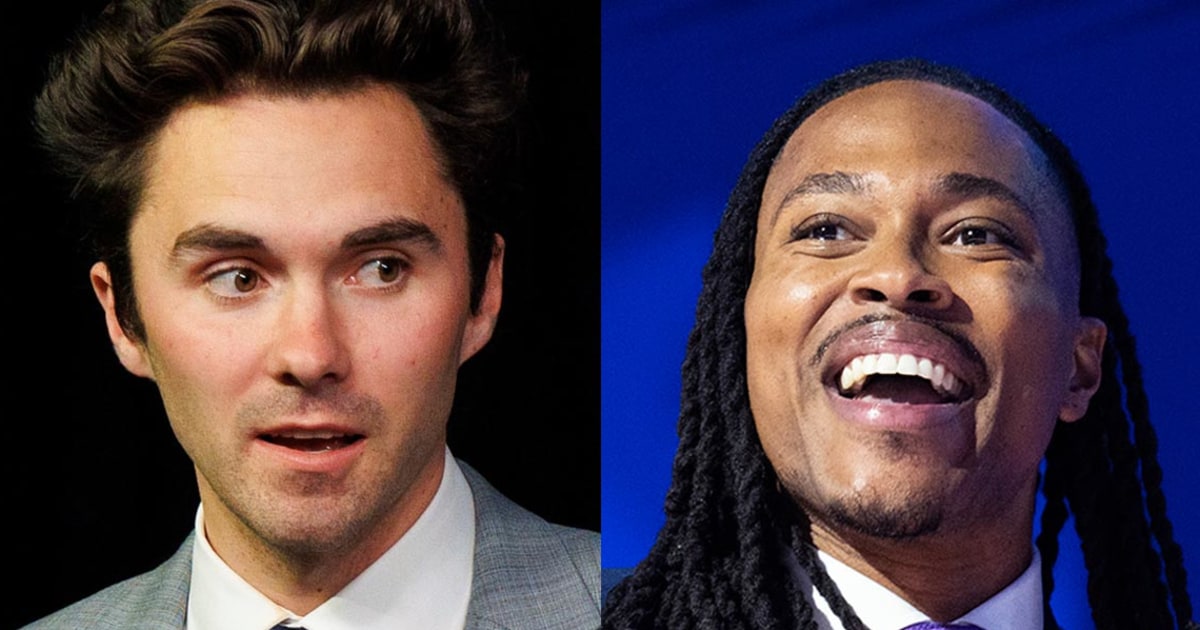
The Democratic National Committee has voted to hold new elections for two of its vice-chair positions after a procedural challenge, meaning Florida activist David Hogg and Pennsylvania state Rep. Malcolm Kenyatta, who were elected to the party’s executive committee in February, have to run again in order to keep their positions.
They won’t have to wait long: A new, virtual, election between Hogg and Kenyatta begins Thursday. And the loser will be able to run in a subsequent election for the final vice-chair slot.
The challenge that triggered the new election isn’t directly related to Hogg’s public spat with the DNC and its chairman, Ken Martin, over Hogg’s decision to support primary challenges to Democratic incumbents. But the weeks-long episode, with Martin and other leaders backing a neutrality pledge for party officers, has inflamed tensions among members and kept the debate between Hogg and the party in the headlines.
Last month, the DNC’s Credentials Committee voted to recommend that the party hold two new vice-chair elections because it found that the DNC mistakenly created an advantage for the two male candidates, Hogg and Kenyatta, as it managed the internal elections at the end of a marathon February party meeting in Washington, D.C.
Wednesday evening the DNC announced that 75% of the votes cast in a virtual election by its members voted in favor of approving that recommendation.
Because DNC rules require equal gender representation on its executive committee, not including the party chair, the results of previous elections in February meant the DNC had to elect at least one man to its final two vice-chair slots. But instead of holding individual votes for each position, one to be filled by a man and one by a candidate of any gender, the party decided to hold one single vote to decide who took the final two slots.
Oklahoma Democratic Committeewoman Kalyn Free, who unsuccessfully ran against Hogg and Kenyatta in the February vice-chair race, petitioned the DNC for a redo, claiming the decision to combine the ballots unfairly benefitted Hogg and Kenyatta over the female candidates who were eligible to win the final vice-chair slot.
Though Free’s challenge was filed well before his public spat with Martin, Hogg framed the decision last month as proof the party was trying to strip him of his title over his support for primary challenges to Democratic incumbents. Both Martin and Kenyatta vehemently disagreed with his framing: Martin blamed a “procedural error” from “before I became chair” for the episode, and Kenyatta criticized Hogg for distracting from the party’s work by arguing the vote amounted to personal retribution.
Shortly after the results were announced Wednesday, Kenyatta said in a statement that “now we can almost bring this chapter to a close,” adding that he looks forward to “making my case to DNC members and our party as a whole” in the snap election.
“We need a strong Democratic Party and I hope we come out of this stronger and focused on the work ahead,” he said.
Tensions between Hogg and the party have been brewing for months, since the activist telegraphed his decision to back Democratic primary challenges. Ahead of the vote, Politico published a short clip of an internal Democratic Party call on which Martin vented his frustration with Hogg, saying the fight has “essentially destroyed any chance I have to show the leadership that I need to.”
The leak prompted another round of finger-pointing, with prominent DNC members accusing Hogg or his allies of orchestrating the leak. Hogg vehemently denied that and published a screenshot he said showed his text messages with the reporter who published the story.
An election for the first vice-chair position between Hogg and Kenyatta will run virtually from Thursday morning through Saturday afternoon. Then, the party will hold another virtual vote Sunday morning through Tuesday afternoon featuring the four remaining candidates who were eligible at the end of the February elections.
